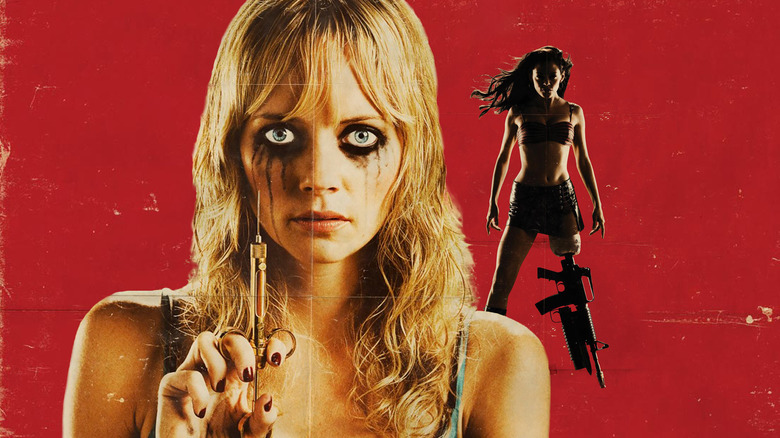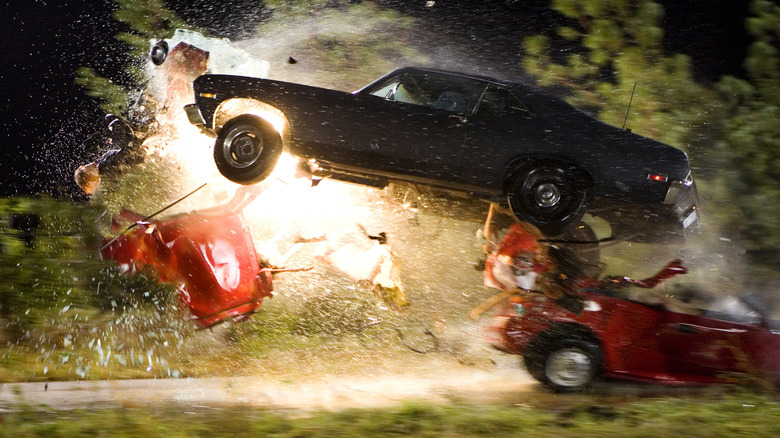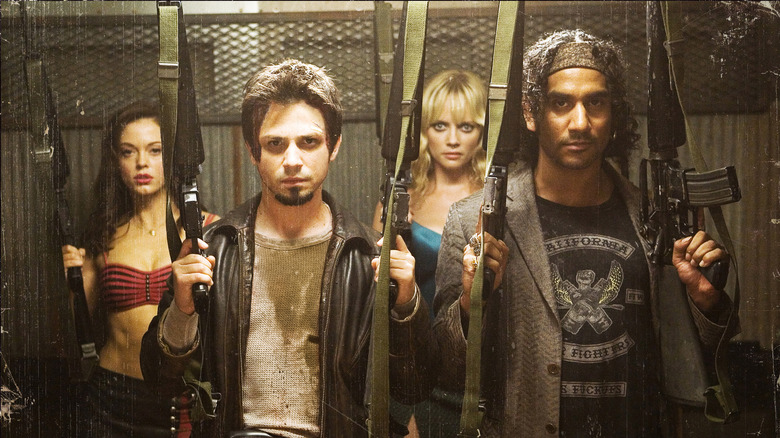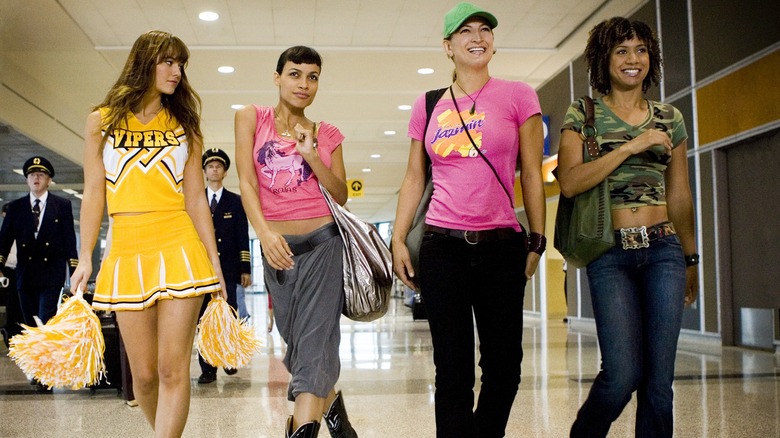Tales From The Box Office: Grindhouse Was A Love Letter That Didn't Get Enough Love
(Welcome to Tales from the Box Office, our column that examines box office miracles, disasters, and everything in between, as well as what we can learn from them.)
There are movies that seem ahead of their time, and there are movies that feel a little behind the times. Then there are movies that become an odd amalgam of both that just seem to be out of time entirely, even if it feels like so many people are rooting for them. Such was the case with "Grindhouse," the unique 2007 experiment from Quentin Tarantino ("Pulp Fiction," "Kill Bill") and Robert Rodriguez ("From Dusk Till Dawn," "Spy Kids") that saw the directors team up for a double feature throwback — one designed for modern moviegoers.
For cinephiles, it seemed like such a cool and unique idea. And yet, general audiences didn't seem to understand or care, which steered the whole thing in the polar opposite direction of commercial success.
Today, in honor of its 15th anniversary this past week, we're going to look back at "Grindhouse," how it came to be, what went wrong when it arrived, and what lessons might be contained within its failure. Let's dig in.
The movie: Grindhouse
It is kind of important to understand where both Tarantino and Rodriguez were at this point in their careers. They firmly had an identity established in Hollywood. Tarantino was coming off of "Kill Bill," while Rodriguez was coming off of "Sin City." They had also collaborated before several times, most notably on "From Dusk Till Dawn." These were two very hip and successful directors, so you can imagine the excitement when they declared that they wanted to make a double feature together.
Tarantino and Rodriguez took respective ideas for movies that could be short enough to screen them together as one cinematic event. For Rodriguez, it was a zombie flick called "Planet Terror," and for Tarantino it was an old-school car chase flick called "Death Proof." With two very different movies that pair together like cheese and wine, the stage was mostly set.
As for how the idea came about in the first place? Speaking to Entertainment Weekly in 2006, Rodriguez had this to say:
"I used to go to Quentin's house and he'd show me these movies in his home theater. He'd always program the night with some really great trailers from the era and then a feature, then a few more trailers, and then another feature. And I was like, 'Man, we have to re-create these nights for the rest of the world!' And right then, he was like, 'We have to call it Grindhouse!'"
Thus, the idea to pay an homage to American Grindhouse cinema was born. And yes, they even included fake trailers for movies like "Machete," "Don't," and "Thankskilling," directed by the likes of Edgar Wright and Eli Roth. There was even a fake trailer for a film called "Hobo With a Shotgun" that mostly played with screenings in Canada. Amazingly, both "Hobo With a Shotgun" and "Machete" were turned into full movies after the fact, which is pretty incredible considering that "Grindhouse" itself was not a commercial success.
The casts for these movies, as one might imagine, were wild as hell, with Rose McGowan, Josh Brolin, Marley Shelton, and even Bruce Willis on deck for "Planet Terror," and Kurt Russell leading the way for "Death Proof" as Stunt Man Mike, with Rosario Dawson, Zoe Bell, and Mary Elizabeth Winstead, among others, making up the ensemble. McGowan also starred in Tarantino's film, serving as a bit of connective tissue.
Two beloved filmmakers. Not one but two great casts. A very fun and ambitious idea, with a seemingly reasonable budget considering the bang for buck here. What could possibly go wrong? Well...
The financial journey
With a combined budget of $67 million, "Planet Terror" and "Death Proof" were released on April 6, 2007, under the name "Grindhouse," making for a cinematic experience that totaled just over three hours. Viewers were getting a lot of value for money; they were getting two movies for the price of one, after all. The general public remained unconvinced, however, and as a result "Grindhouse" bombed pretty damn hard. Its opening weekend total was a mere $11.5 million, setting up a disastrous domestic run of just $25 million.
The decision was then made to split up the release internationally, but that did little to help matters as the movies collectively grossed only another $25 million overseas. All told, "Grindhouse" earned just barely over $50 million at the box office (though it did generate nearly $37 million on home video, which certainly helped to ease the sting). Even if the venture has somehow managed to break even over the years, that is far from what Bob and Harvey Weinstein had probably hoped when they gave "Grindhouse" the green light and released it through Dimension Films. As for what went wrong, Tarantino addressed that in 2020, with the benefit of hindsight:
"With Grindhouse, I think me and Robert just felt that people had a little more of a concept of the history of double features and exploitation movies ... No, they didn't. At all. They had no idea what the f*** they were watching. It meant nothing to them, alright, what we were doing. So that was a case of being a little too cool for school."
Yeah, given that there were reports of people walking out after "Planet Terror" and not sticking around for "Death Proof," it's pretty clear that something got lost in translation here and the understanding from general audiences was greatly overestimated. Whoops.
The lessons contained within
We need not give any lessons to Quentin Tarantino and Robert Rodriguez. They are both highly accomplished filmmakers and the "Grindhouse" movies are generally well-regarded, even if "Death Proof" is not often ranked near the top of Tarantino's filmography. In any event, nobody has really argued that "Grindhouse" failed because the movies were bad; that wasn't the case. It was very likely, as Tarantino put it, that this was simply too cool for school. That's a shame, especially in a year like 2007 where moviegoing was extremely healthy and robust, with "Transformers" going on to destroy box office records that summer.
The unfortunate truth of it all here is that "Grindhouse" is so much of what I and other movie lovers ask for from Hollywood studios. Let good filmmakers do original things. Keep the budgets reasonable so we don't take a quick and expected trip to Flop City. It just wasn't in the cards in this case. That was a shame then, and it remains a shame now. I understand why this movie was green lit, and I also understand why it didn't perform like everyone had hoped in hindsight.
My main takeaway, in reflection, is that I hope studios and streamers currently don't shy away from unique ideas in the currently landscape. Sure, "Grindhouse" didn't work, but in an era when only superheroes and horror movies are guaranteed hits, invention is necessary. Take some swings when the pieces fit together! The potential reward is worth the risk, especially when considering that any gigantic blockbuster not tied to Marvel is often even more likely to lose people a lot of money (apologies to "Moonfall"). Don't let one relative disappointment discourage you, because the next great idea could be a hit.



